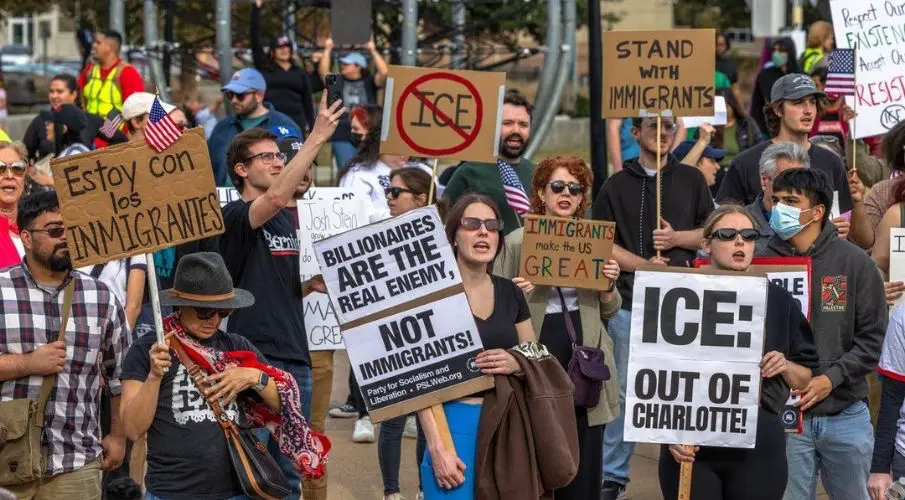Charlotte experienced a low point this weekend unlike anything the city had seen in years. Within a few hours, the everyday life of a metropolis that is usually shaped by Latin American life, international immigration and economic growth turned into a scene of fear, closed doors and people running away. What began as the inconspicuous appearance of a few patrol cars became, within a very short time, the largest operation against migrants in North Carolina’s recent history. More than eighty arrests on Saturday alone, accompanied by heavily armed officers who combed through parking lots, walked through stores and did not even spare church grounds.

Under the leadership of Gregory Bovino, who had carried out similar operations in Chicago and Los Angeles in recent months, the Border Patrol spread across Charlotte as if the city were located at an international border crossing and not 170 miles from the next coastal point. Restaurants where reggaeton usually plays remained closed. The large flea market, a gathering place for Latin American families, canceled its entire operation. Even Catholic parishes were unusually empty on Sunday because many, out of fear, did not even come to Mass.
A busy Sunday for the Regional Office of U.S. Customs and Border Protection (CBP) in the Southeast, which continues to carry out “Operation Charlotte’s Web” in Charlotte. The scene took place at a construction site. Dozens of demonstrators followed the officers, shouted at them, held up small paper signs and blew whistles, apparently to warn people – and everyone is angry.
The images from the city speak for themselves: A young man helping with a church cleanup was taken away. Workers at a Home Depot store who had just finished their shift were stopped. A landscaper putting up Christmas decorations came into the officers’ sights. A Hispanic U.S. citizen had to watch as a Border Patrol agent shattered the window of his truck. For many residents, the weekend felt like a shock that pulled the ground out from under their feet.

Nikki Marín Baena from the organization Siembra NC found clear words for it. She spoke of a “day of shame” on which the Republican Party in North Carolina celebrated the arrival of the officers, even though they moved across the city as if the aim were to intimidate an entire community. In fact, earlier operations in other states had hardly looked different: Many of those arrested had no significant criminal records. But the Trump administration has for years considered anyone without legal status in the United States to be a criminal as such – a view that now forms the basis of these raids.

At the international supermarket “Super G Mart,” the situation completely escalated on Saturday. Five employees were returning shopping carts when several SUVs pulled up. Some ran away instinctively, frightened by uniforms and weapons. A young employee was pushed to the ground and taken away by two agents, according to owner Peter Han. Two other employees were also taken into the officers' vehicles. Teenage cashiers fled to the back of the store and barricaded themselves in the restroom out of fear. On Sunday, more than half of the staff stayed home – worried about being targeted again.

The city administration and the county had already warned that such operations could occur. Governor Josh Stein called on people to remain calm but to document any misconduct. “When we see injustice, we must not look away,” he said, urging people to film problematic situations and report them to local police – the authorities responsible for safety in the region once the federal officers leave. Many in Charlotte wonder why their city became a target at all. The Border Patrol is actually tasked with securing border regions, not economic centers in the interior. But for months a pattern has been emerging: places with large immigrant communities are increasingly drawing attention. Charlotte is growing rapidly, especially through people from Latin America, and this dynamic now seems to be interpreted in Washington as an invitation.

How long the operation will last remains unclear. The officers are expected to move on to New Orleans afterwards. Asheville, in the western part of the state, is already preparing for the possibility of being next. Charlotte, meanwhile, remains under the impression of a weekend that felt like a warning – an intervention from outside that took away the sense of safety from tens of thousands of people overnight. What remains is an atmosphere of fear, emptiness and the sense that what has begun here might just be the start of something larger.
Investigative journalism requires courage, conviction – and your support.
Please help strengthen our journalistic fight against right-wing populism and human rights violations. Every investigative report, every piece of documentation, every day and every night – all of it requires time, research and legal protection. We do not rely on advertising or corporations, but solely on people who make independent journalism possible. People like you.
Not everyone can give the same amount. But everyone can make a difference. Every contribution protects a piece of journalistic independence.
Updates – Kaizen News Brief
All current curated daily updates can be found in the Kaizen News Brief.
To the Kaizen News Brief In English
Ich kann diese Berichte kaum noch anhören. Für mich sind diese Vorgänge schlicht unvorstellbar. Diese brutale Menschenjagd übertrifft jede Fiktion
Mich erinnert das an eine Heuschreckenplage.
Sie fallen ein und hinterlassen nichts als Zerstörung
Und dazu noch zutiefst traumatisierte Menschen.
Keiner ersetzt den Schaden, den diese Gestapo ICE hinterlässt.
Hauptsache Angst verbreiten.
Unruhen provozieren, damit es keine Midterms gibt.
Ashville?
Ist das nicht der Ort, der noch mit den dramatischen Folgen des letzten Hurricane kämpft?
Die brauchen ICE ganz sicher 🤮
Wo ist nur Amerika?